Stars Over Colombo is a film of genre Adventure directed by Veit Harlan with Kristina Söderbaum
Stars Over Colombo (1953)
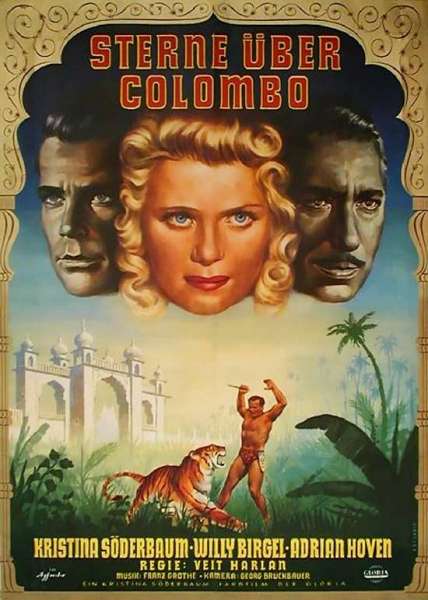
If you like this film, let us know!
Stars Over Colombo (German:Sterne über Colombo) is a 1953 West German adventure film directed by Veit Harlan and starring Kristina Söderbaum, Willy Birgel and Adrian Hoven.
Actors
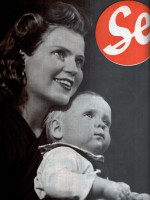
Kristina Söderbaum
(Yrida)

Willy Birgel
(Maharadscha von Jailapur Gowan)

Adrian Hoven
(Gowaran)

Karl Martell
(Dari)
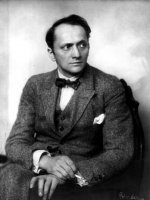
Theodor Loos
(Der heilige Mann)
Comments
Leave comment :
Suggestions of similar film to Stars Over Colombo
There are 73 films with the same actors, 17 films with the same director, 9984 with the same cinematographic genres, to have finally 70 suggestions of similar films.If you liked Stars Over Colombo, you will probably like those similar films :

Circus Girl (1954)
, 1h43Directed by Veit Harlan
Genres Adventure
Actors Kristina Söderbaum, Willy Birgel, Adrian Hoven, Karl Martell
Rating45%





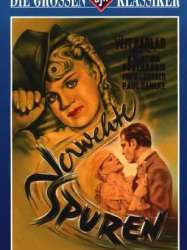
Covered Tracks (1938)
, 1h21Directed by Veit Harlan
Genres Drama, Crime
Actors Kristina Söderbaum, Philip Dorn, Heinrich Schroth, Friedrich Kayßler, Paul Dahlke, Leo Peukert
Rating68%





Séraphine arrive avec sa mère à Paris pour visiter l'Exposition universelle. Elles doivent loger dans deux hôtels différents. Le lendemain, lorsqu'elle vient retrouver sa mère, celle-ci a disparu, et c'est comme si elle n'avait même pas été à l'hôtel du tout...
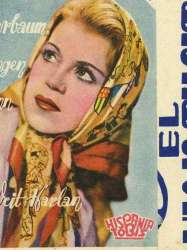
The Journey to Tilsit (1939)
, 1h30Directed by Veit Harlan
Genres Drama
Actors Kristina Söderbaum, Philip Dorn, Albert Florath, Eduard von Winterstein, Anna Dammann, Wolfgang Kieling
Rating68%





Elske faithfully loves her husband Endrik as he is seduced by a foreign schemer, Madlyn. Madlyn persuades him to murder Elske and run off with her. He lures Elske into the boat as a prelude to drowning her, but is unable to carry it out. When they reach the shore, she flees to the city, and he follows to plead for forgiveness. They return, and a storm blows up while they are in the boat. Endrik gets ashore, but believes Elske to have drowned. He reacts with anger to Madlyn, but learns that Elske did survive.

The Immortal Heart (1939)
, 1h47Directed by Veit Harlan
Origin German
Genres Drama, Historical
Themes Théâtre, Films based on plays
Actors Heinrich George, Kristina Söderbaum, Auguste Prasch-Grevenberg, Paul Wegener, Raimund Schelcher, Michael Bohnen
Rating68%





Ce film raconte la vie quelque peu romancée de Peter Henlein, un serrurier et horloger de Nuremberg à la fin du XV et du début du XVI siècle, souvent considéré comme l'inventeur de la montre, dite "L'œuf de Nuremberg", même si cela est discuté. Il s'agit de l'apologie d'une vie d'humanité, de conscience et de labeur.
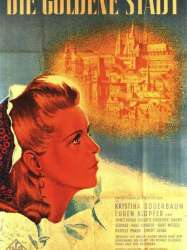
The Golden City (1942)
Directed by Veit Harlan
Genres Drama
Themes Politique, Political films
Actors Kristina Söderbaum, Eugen Gottlob Klöpfer, Annie Rosar, Kurt Meisel, Dagny Servaes, Rudolf Prack
Rating60%





Anna, a young, innocent country girl (a Sudeten German), whose mother drowned in the swamp, dreams of the golden city of Prague. After she falls in love with a surveyor, she runs away to Prague to find him. She is instead seduced and abandoned by her cousin (a Czech). She attempts to return home, but her father rejects her, and she drowns herself in the swamp where her mother died.

Süss, the Jew (1940)
, 1h36Directed by Veit Harlan
Genres Drama, Historical
Themes Politique, Films about religion, Political films, Films about capital punishment, Films about Jews and Judaism
Actors Ferdinand Marian, Werner Krauss, Heinrich George, Kristina Söderbaum, Eugen Gottlob Klöpfer, Bernhard Goetzke
Rating49%





The film begins with the coronation of Karl Alexander, Duke of Württemberg (Heinrich George), a man much beloved by his people, who swears an oath to obey the laws of the dukedom "according to the traditional Württemberg loyalty and honesty." However, the Duke soon becomes frustrated because the Württemberg Diet (the provincial council) refuses him the funds needed to maintain a lifestyle comparable to his neighboring sovereigns; in particular, he wants a personal bodyguard, an opera company, and a ballet company. Lacking funds even to purchase coronation gifts for the Duchess (Hilde von Stolz), the Duke sends a courtier to Frankfurt to borrow money from Joseph Süß Oppenheimer (Ferdinand Marian). Süß shows the emissary jewels and jewelry that are obviously beyond the Duke's means and then says that it would be his honor to provide the Duke with jewelry at a substantial discount. However, Süß insists on presenting the items to the Duke personally despite a ban against Jews (Judenbann) entering the city that has been in force for over a century. Armed with a pass from the Duke, Süß cuts his hair, shaves his beard, and dons "Christian" clothes so that he can enter Württemberg disguised as a Christian. As his carriage gets into an accident, Süß gets a lift from Dorothea Sturm (Kristina Söderbaum) to the city.

The Great King (1942)
, 1h58Directed by Veit Harlan
Genres Drama, War, Historical
Themes Political films, Films about royalty
Actors Otto Gebühr, Kristina Söderbaum, Gustav Fröhlich, Hans Nielsen, Hilde Körber, Paul Wegener
Rating68%





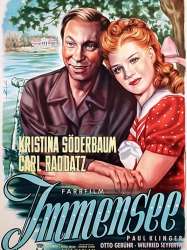
Immensee (1943)
, 1h28Directed by Veit Harlan
Genres Drama, Romance
Themes Films about music and musicians
Actors Kristina Söderbaum, Carl Raddatz, Otto Gebühr, Germana Paolieri, Vadim Glowna, Max Gülstorff
Rating64%





Elisabeth (Kristina Söderbaum) falls in love with Reinhardt (Carl Raddatz), but he leaves their native village to study music, travel the world and build his career as a composer. His most important compositions are inspired by his love for her, Twelve Songs of Elisabeth and Seerosen (water lilies, the couple's special flower), but after she visits him on the day of his final examination at the conservatoire and finds a strange woman asleep in his bed, Elisabeth marries Erich (Paul Klinger), the wealthy heir to the estate of Immensee. Reinhardt returns to win her back, and Erich releases her, telling her that all that he wants is for her to be happy. This causes Elisabeth to realise what love really means and she tells Erich for the first time that she loves him, and remains with him. In the frame story, many years have passed, Erich is dead and Elisabeth and Reinhardt, who is now a renowned composer, meet for tea at his hotel after a performance of his Seerosen; at the end of the film, she tells him she will remain true to Erich and to Immensee, and he leaves for the last time.

Burning Hearts (1945)
, 1h50Directed by Veit Harlan
Genres Drama, War, Historical, Romance
Themes Politique, Political films, Histoire de France, Napoleonic Wars films, French Revolution films
Actors Kristina Söderbaum, Heinrich George, Paul Wegener, Gustav Diessl, Horst Caspar, Claus Clausen
Rating59%





The film begins in 1813 after the phase of the Napoleonic Wars known in German as the Befreiungskriege (War of Liberation). The opening scenes show Prussian Landwehr and volunteers marching down the streets of Breslau through enthusiastic crowds. This is followed by a dialogue between King Frederick William III of Prussia and Count August von Gneisenau, in which Gneisenau explains that the siege of Kolberg taught the importance of citizen armies. Ending with the admonition that kings who cannot lead must abdicate, the scene switches to Vienna in 1806 to show the abdication of the last Holy Roman Emperor, Francis II of Austria, whom the script has Gneisenau call "an Emperor who abandoned the German people in their hour of need".
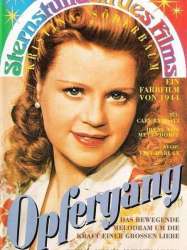
The Great Sacrifice (1944)
Directed by Veit Harlan
Genres Drama, Romance
Actors Carl Raddatz, Kristina Söderbaum, Franz Schafheitlin, Ernst Stahl-Nachbaur, Otto Tressler, Ludwig Schmitz
Rating66%





Albrecht Froben, though married to Octavia, falls in love with his neighbor, Äls Flodéen. She, however, is slowly dying from a debilitating disease. During an epidemic, Albrecht goes to bring her daughter to safety but he catches typhoid and is quarantined in hospital. Octavia, realising the love match, and hearing that Als is now bedridden and dying, dresses up as him and rides by her gates every day to keep her spirits up - her bed is next to the window. Albrecht returns. Äls has a dream in which she talks to her projection of Albrecht and concludes that she does not wish to take part in this union and accepts death. Albrecht is reconciled with his wife.
 Connection
Connection